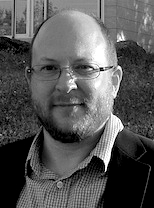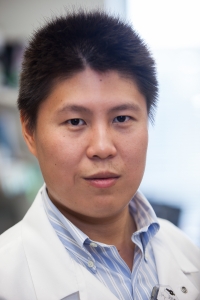Researcher Highlights
Sam Cheng, M.D., Ph.D., is conducting research focused on the calcium-sensing receptor, or CaSR, which is a unique G protein-coupled cell surface receptor that uses simple nutrients such as calcium, polyamines and amino acids as its ligands. While CaSR is widely expressed in the gut, its functions are unknown. Cheng has generated preliminary data that the CaSR regulates intestinal function and may be a target for the development of novel anti-diarrheal therapies.
Acute infectious diarrhea is a worldwide and lethal problem, especially among infants and young children. Millions of children die each year as a result of the associated dehydration. The currently recommended Oral Rehydration Solution, or ORS, the only oral therapy available for children with acute diarrhea, does not reduce its severity or duration nor does it treat inflammation. There are a few anti-secretory therapies in development. However, they are very expensive , not as efficacious as originally anticipated, and haven’t been shown to be safe in the pediatric population. Thus, new therapeutic approaches for diarrhea are needed.
Cheng hypothesizes that CaSR is a conserved anti-secretory, anti-motility and anti-inflammatory mechanism in the gut and that activating intestinal CaSR will reduce the magnitude and duration of diarrhea, both secretory and inflammatory.
Cheng is an Assistant Professor in the Gastroeterology, Hepatology and Nutrition Division of the Department of Pediatrics.
Jaso n Coleman, Ph.D., Child Health Research Institute
n Coleman, Ph.D., Child Health Research Institute
Jason Coleman, Ph.D., researches how cortical circuit connectivity and function are modified by experience and how perinatal insults, such as hypoxia-ischemia, disrupt the development and function of specific circuits in the cortex.
Even subtle disruptions in cortical connectivity can lead to profound neurological and cognitive deficits in infants and young children. Furthermore, deficits linked to hypoxic events are becoming more common as the number of premature births increases.
Coleman monitors pre- and post-synaptic structures and neural functions in the intact brains of subjects. Previously he showed that thalamocortical synapse remodeling occurs rapidly in response to visual changes and is tightly coupled to changes in cortical function. These thalamocortical axons are also a major constituent of the white matter that is damaged by perinatal hypoxia-ischemia. Now, Coleman is applying the knowledge of visual system anatomy and function to understand when and where deficits in axonal function and connectivity occur and how they directly influence specific cortical functions and behavior. It’s hoped that knowledge gained from these basic studies in neural circuit development and function will help guide the development of novel targets and therapies for reversing or ameliorating the effects of perinatal brain injury in children.
Coleman completed his undergraduate studies in neurobiology and his doctoral studies in the Interdisciplinary Program in Biomedical Sciences at UF. He then went on to conduct his postdoctoral fellowship at the Picower Institute for Learning and Memory at MIT. Coleman is now an Assistant Professor in the Department of Pediatrics at the Child Health Research Institute.
Mai ElMal lah, M.D., Pulmonary Fellow
lah, M.D., Pulmonary Fellow
Mai ElMallah, M.D., focuses her research on respiratory dysfunction in Pompe Disease, with an emphasis on upper airway dysfunction.
Pompe Disease is a glycogen storage disorder reflecting dysfunction of the lysosomal enzyme acid alpha-glucosidase, or GAA. Patients have macroglossia and tongue motor dysfunction with dysarthria, dysphagia and upper airway obstruction.
ElMallah’s main project focuses on gene delivery to the tongue of the Pompe mouse model with a goal of correcting both muscle and motoneuron disease. So far, data from this project suggests that AAV9 is an effective vector for retrograde gene delivery and gene replacement therapy targeting tongue motor units in Pompe disease. Additionally, ElMallah is studying the therapeutic efficacy of novel compounds, ampakines, on the respiratory motor output in Pompe Disease. Ampakines can enhance excitatory glutamatergic neural transmission in respiratory neurons and networks. They are a promising therapeutic option for respiratory dysfunction in Pompe Disease. Finally, ElMallah is also researching the synergistic effects of ampakines and gene therapy on tongue and XII dysfunction in the Pompe Disease mouse model.
ElMallah is a pediatric pulmonologist working in the labs of Dr. David Fuller and Dr. Barry Byrne.
 Darin Falk, Ph.D., Child Health Research Institute
Darin Falk, Ph.D., Child Health Research Institute
Darin Falk, Ph.D., and his laboratory team are immersed in research that is revealing new details about neuromuscular disease and potential therapies. Insights from their research could contribute to new treatments for diseases which have a profound effect on nerves and skeletal muscle.
The neuromuscular junction plays an integral role on the way we move and breathe, and such complications are often associated with a large subset of neuromuscular disease. Falk is using gene therapy vectors to restore neuronal and skeletal muscle function in neuromuscular disease by identifying efficacy through molecular, biochemical approach. They also aim to enhance how gene therapy vectors deliver transgenes to affected tissues.
Falk joined the UF Department of Pediatrics Child Health Research Institute in June 2012. He received his B.S. and M.A.Ed. from the University of Nebraska-Kearney and he completed his Ph.D. in the Department of Applied Physiology and Kinesiology at UF in December of 2007. Falk recently completed a postdoctoral fellowship with Barry Byrne, M.D., Ph.D., at UF, and was awarded one of six Development Awards by the MDA.
 Roland Herzog, Ph.D., Cellular and Molecular Therapy
Roland Herzog, Ph.D., Cellular and Molecular Therapy
Roland Herzog, Ph.D., is on a quest to find a better treatment for hemophilia through gene therapy. The ideal treatment would involve an injection of a harmless vector delivering a therapeutic gene to enable the body’s cells to produce the missing clotting factor indefinitely. The current treatment is often rejected by the immune system, is extraordinarily expensive and does not cure the disease as spontaneous bleeds will occur unless injections occur frequently for the lifetime of the patient.
In 2000, Herzog made a breakthrough discovery while experimenting in mice. Gene transfers to the liver achieved long-term expression. Liver gene transfers to hemophilic dogs led to many years of stable therapeutic expression, as the longest-followed treated canine is still alive and has not experienced bleeding in 13 years. Encouraged by the data, physician-scientists carried out clinical trials, which recently led to the first sustained therapeutic expression in humans.
Herzog received a Ph.D. in Microbiology from Auburn University in 1996, subsequently performed postdoctoral research in gene therapy at the Children’s Hospital of Philadelphia and became Assistant Professor of Pediatrics at the University of Pennsylvania in 2000. In 2005, he joined the University of Florida as an Associate Professor and is now a Professor of Pediatrics. The UF College of Medicine honored Herzog in 2012 with the Faculty Research Award in Basic Science.
 Chen Ling, Ph.D., Cellular and Molecular Therapy Fellow
Chen Ling, Ph.D., Cellular and Molecular Therapy Fellow
Chen Ling, Ph.D., aims to develop novel recombinant adeno-associated virus vectors, or rAAV, which would selectively and efficiently target hepatoblastoma, or HB, cells, while minimizing the risk of disease. Ling’s research, using specific DNA elements, explores various techniques to maximize the targeting of malignant cells without affecting normal ones. While this type of therapy has proved successful in inherited genetic diseases, such as hemophilia, using it to treat cancer cells is a unique idea.
Although HB treatments have improved in recent years, approximately 30 percent of pediatric patients still succumb to the illness within 10 years of diagnosis. Current therapies are both costly and in short supply. For example, liver transplantation can cost upwards of $150,000 and donor shortages, as well as post-transplant rejection, can limit the widespread use of this method significantly. Therefore, alternative therapies are warranted.
To further his research, Ling was awarded three grants totaling nearly $500,000 in July, a great achievement for any researcher. This is especially noteworthy considering Ling’s position as a second-year post-doctoral fellow and limited funding options for international students.
Ling, a Research Assistant Professor in the Division of Cellular and Molecular Therapy within the Department of Pediatrics, graduated from Fudan University in China in 2007, and completed his Ph.D. at UF in 2011, in less than three years.
 Bryon Petersen, Ph.D., Child Health Research Institute
Bryon Petersen, Ph.D., Child Health Research Institute
Bryon Petersen, Ph.D., has been recognized worldwide as a foremost authority in hepatic stem cells and their role in liver pathobiology. He is currently conducting research in stem cell biology and how it relates to the patho-physiology of the liver. Petersen’s seminal paper in “Science” helped usher in the stem cell field as we know it today, showing that bone marrow-derived cells could become functioning hepatocytes.
Petersen is currently following several research focuses.
He is investigating the usefulness of gene and stem cell therapy in the treatment of certain inherited metabolic diseases of the liver, such as Crigler-Najjar Syndrome and Glycogen Storage Disease. He is also investigating how both mature and stem cells can be utilized in regenerating functional hepatic tissue that can be used in a bio-reactor device to enable a patient’s own liver to repair and regenerate. Petersen’s laboratory is also working on whether or not bone marrow-derived cells can be used in the treatment of Type-1 Diabetes. Lastly, he has begun work on the therapeutic targeting of stem cells in hepatocellular carcinoma.
Petersen received his B.A. from the University of Iowa and his M.S. and Ph.D. from the University of Pittsburgh. His post-doctorate training continued at Pittsburgh, in the Department of Pathology. In 2000, Petersen joined UF as an Assistant Professor and was promoted to an Associate Professor. He left in 2010 to accept a position at Wake Forest Institute of Regenerative Medicine, and returned to UF’s Department of Pediatrics in July of 2012.


